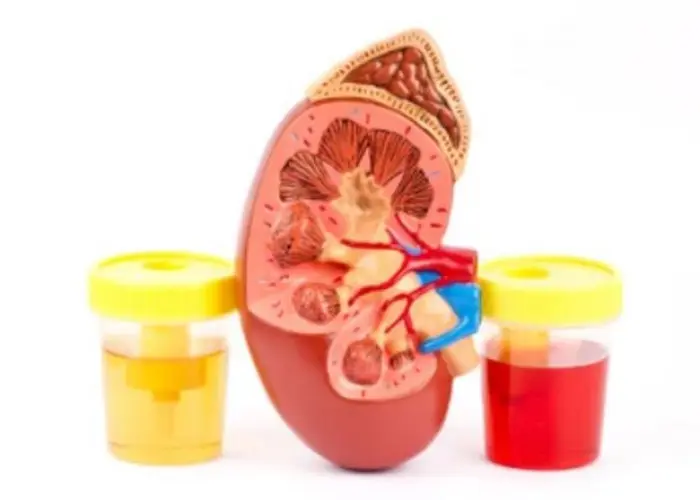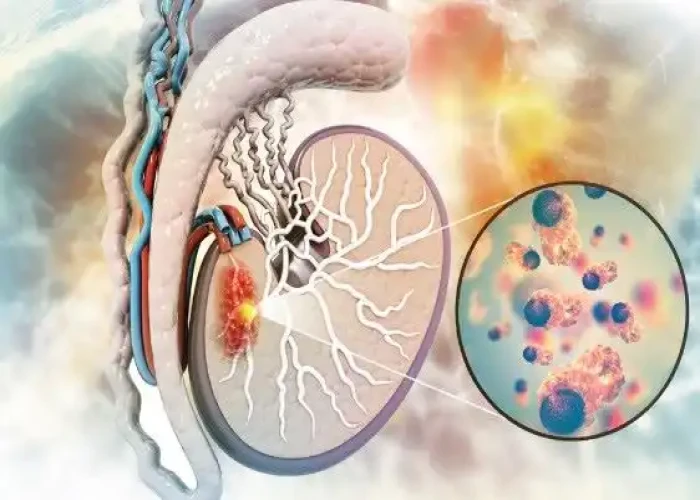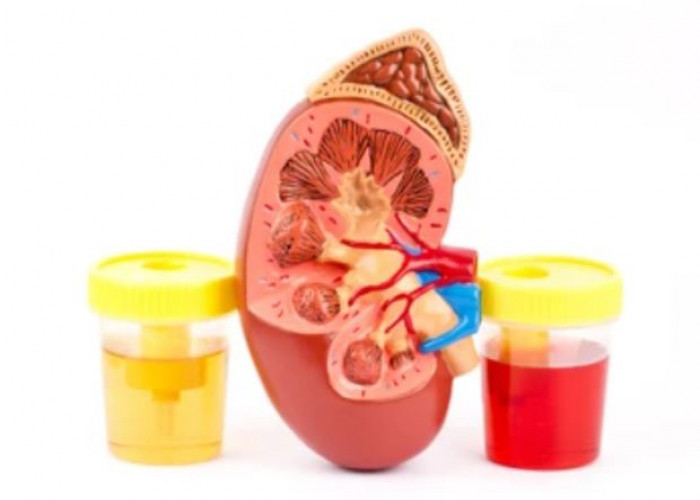 Welcome
Welcome
“May all be happy, may all be healed, may all be at peace and may no one ever suffer."
Blood in urine (Hematuria)

Blood in urine, or hematuria, is a symptom that can indicate an underlying medical condition. Hematuria can be either visible or microscopic, which means it may only be detectable with a urine test. Causes of hematuria can include urinary tract infections, kidney stones, bladder or kidney cancer, prostate problems, or certain medications. In some cases, hematuria may not be associated with any underlying medical condition. Treatment for hematuria depends on the underlying cause, and may include antibiotics, medication to help break up kidney stones, or surgery to remove a tumor. Individuals who notice blood in their urine should contact a healthcare provider to determine the underlying cause and appropriate treatment.
Research Papers
Disease Signs and Symptoms
- Dark urine color
- Blood in urine (hematuria)
- Passing blood clots in your urine, however, can be painful.
- Bloody urine often occurs without other signs or symptoms.
Disease Causes
Blood in urine (hematuria)
In hematuria, your kidneys — or other parts of your urinary tract — allow blood cells to leak into urine. Various problems can cause this leakage, including:
- Urinary tract infections. These occur when bacteria enter your body through the urethra and multiply in your bladder. Symptoms can include a persistent urge to urinate, pain and burning with urination, and extremely strong-smelling urine.
- For some people, especially older adults, the only sign of illness might be microscopic blood in the urine.
- Kidney infections (pyelonephritis). These can occur when bacteria enter your kidneys from your bloodstream or move from your ureters to your kidney(s). Signs and symptoms are often similar to bladder infections, though kidney infections are more likely to cause a fever and flank pain.
- A bladder or kidney stone. The minerals in concentrated urine sometimes form crystals on the walls of your kidneys or bladder. Over time, the crystals can become small, hard stones.
- The stones are generally painless, so you probably won't know you have them unless they cause a blockage or are being passed. Then there's usually no mistaking the symptoms — kidney stones, especially, can cause excruciating pain. Bladder or kidney stones can also cause both gross and microscopic bleeding.
- Enlarged prostate. The prostate gland — which is just below the bladder and surrounding the top part of the urethra — often enlarges as men approach middle age. It then compresses the urethra, partially blocking urine flow. Signs and symptoms of an enlarged prostate (benign prostatic hyperplasia, or BPH) include difficulty urinating, an urgent or persistent need to urinate, and either visible or microscopic blood in the urine. Infection of the prostate (prostatitis) can cause the same signs and symptoms.
- Kidney disease. Microscopic urinary bleeding is a common symptom of glomerulonephritis, an inflammation of the kidneys' filtering system. Glomerulonephritis may be part of a systemic disease, such as diabetes, or it can occur on its own. Viral or strep infections, blood vessel diseases (vasculitis), and immune problems such as IgA nephropathy, which affects the small capillaries that filter blood in the kidneys (glomeruli), can trigger glomerulonephritis.
- Cancer. Visible urinary bleeding may be a sign of advanced kidney, bladder or prostate cancer. Unfortunately, you might not have signs or symptoms in the early stages, when these cancers are more treatable.
- Inherited disorders. Sickle cell anemia — a hereditary defect of hemoglobin in red blood cells — causes blood in urine, both visible and microscopic hematuria. So can Alport syndrome, which affects the filtering membranes in the glomeruli of the kidneys.
- Kidney injury. A blow or other injury to your kidneys from an accident or contact sports can cause visible blood in your urine.
- Medications. The anti-cancer drug cyclophosphamide and penicillin can cause urinary bleeding. Visible urinary blood sometimes occurs if you take an anticoagulant, such as aspirin and the blood thinner heparin, and you also have a condition that causes your bladder to bleed.
- Strenuous exercise. It's rare for strenuous exercise to lead to gross hematuria, and the cause is unknown. It may be linked to trauma to the bladder, dehydration or the breakdown of red blood cells that occurs with sustained aerobic exercise.
- Runners are most often affected, although anyone can develop visible urinary bleeding after an intense workout. If you see blood in your urine after exercise, don't assume it's from exercising. See your doctor.
Often the cause of hematuria can't be identified.
Disease Prevents
Disease Treatments
Depending on the condition causing your hematuria, treatment might involve taking antibiotics to clear a urinary tract infection, trying a prescription medication to shrink an enlarged prostate or having shock wave therapy to break up bladder or kidney stones. In some cases, no treatment is necessary.
Be sure to follow up with your doctor after treatment to ensure there's no more blood in your urine.
Disease Diagnoses
Disease Allopathic Generics
-
Phytomenadione (Injection)
After 8 hours the injection should be done in the meat.
- Monosemicarbazone Adrenochrome
-
Aminocaproic acid
1 injection into the flesh every 8 hours or daily.
-
Calcium Lactate
Medicines containing calcium lactate in case of calcium deficiency.
1 pill 2/3 times daily. Should be given with caution in patients with high blood pressure.
-
Cephradine
1 capsule every 6 hours or 1 capsule of 500 mg 2/3 times a day for 5/7 days.
-
Ciprofloxacin
1 pill in the morning and 1 pill in the evening for 14 days.
-
Vitamin C [Ascorbic acid]
1 pill should be sucked 3 times a day.
-
Vitamin B complex
1 capsule 2 times a day.
-
Diazepam
1 can be given in meat or saline.
Disease Ayurvedic Generics
Disease Homeopathic Generics
Disease yoga
Blood in urine (Hematuria) and Learn More about Diseases

Galactorrhea

High blood pressure in children

Chiari malformation

Hirsutism

Sarcoma

Achilles tendon rupture

Testicular cancer

Rhabdomyosarcoma
Blood in urine, Hematuria, Haematuria causes, প্রস্রাবে রক্ত, হেমাটুরিয়া
To be happy, beautiful, healthy, wealthy, hale and long-lived stay with DM3S.
